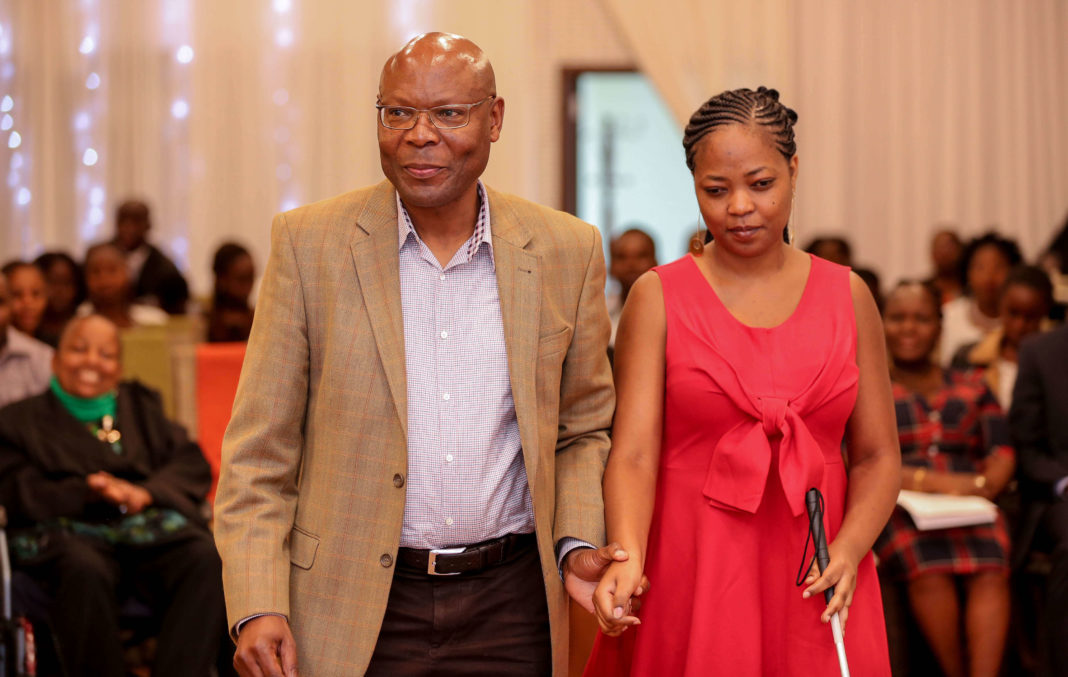
As a human right that is intrinsic to all, governments, institutions and social and delivery systems should be attuned to the obstacles faced by disadvantaged, vulnerable and marginalized groups in the society. Speaking at the launch of the UNDP report in Stockholm last year, Swedish Prime Minister Stefan Löfven said, “Leaving no one behind needs to become the way we operate as a global community.”
Using technology to create relevant products and services that transform lives and empower communities is but one of the ways that Safaricom is creating shared value in their business. With this, inclusion is paramount in achieving this goal – by providing various business units to open up more opportunities to the marginalized. Here are some of the ways that the telco is putting a stronger focus on those excluded and ‘less seen’
New IVR service offers visually impaired customers independence and convenience
Safaricom launched a new Interactive Voice Recognition (IVR) M-PESA balance enquiry service for visually-impaired people in December 2017.
Visually-impaired people are vulnerable to fraud when they transact on M-PESA
because they must rely on third parties to handle their cash deposits and
withdrawals. Moreover, the thefts are often only discovered much later, when the
visually-impaired person shares their M-PESA PIN with a different third party and asks them to confirm their balance.
The new service enables a visually-impaired person to check and hear their M-PESA balance by following oral prompts on our adapted customer service IVR system.
The new service has been an instant success and already handles an average of
1,500 enquiries per day, which surges to 2,500 enquiries on average per day during
the first and last weeks of the month.
 Fafanuka 215
Fafanuka 215
An SMS-based information service that aims to provide support and information to patients suffering from non-communicable diseases — for example, cancer, epilepsy and diabetes — and their families. The service can be accessed by dialing *215#.
During the year, focus groups were held
in Embu and Nairobi and the insights gathered were used to re-evaluate the
product value proposition and redesign the service. An enhanced version has since been piloted to 1,200 subscribers and they anticipate launching the product nationally in FY19.
Chapa Dimba na Safaricom
The Chapa Dimba na Safaricom Football
Tournament aims to recruit young talented
footballers, aged between 16 and 20 years old, to play in a national tournament, showcase their talent, and enjoy an opportunity to earn from their
passion by winning the overall prize money worth Ksh 1 million and an international training camp opportunity.
Over 1,600 teams from across the country
registered for the first season and with the second season underway, teams around the country stand the chance of the winning teams walking away with Kshs 1Million in prize money.
Safaricom Jazz
In 2007, Ghetto Classics founder Elizabeth Njoroge started to host a programme of classical music in a local radio, that was sponsored by Safaricom, and came to understand that more people than she thought were interested in classical music, even those who aren’t members of the wealthy white community.
“Playing music makes you forget the world around you. Troubles can be left behind and there is room again to focus on the positive things in life. I’ve seen it first hand especially in the first days of starting the Ghetto Classics programme in 2008”, Elizabeth Njoroge says. Music also gives the poorest children the skills to overcome their daily challenges: “If you can master an instrument, you can master life”, she adds while smiling.
Safaricom Jazz not only brings people together for the purpose of enjoying jazz music, they also give local bands the opportunity of a lifetime to perform on the Safaricom Jazz stage as well as contributing to the welfare of the Ghetto Classics kids. All the proceeds of the festival have gone to the Ghetto Classics with over Kshs 60 million going to the growth of the talent of over 1,400 children in Nairobi and Mombasa.



















[…] year, Safaricom introduced the Interactive Voice Response (IVR), an M-PESA solution that would enable the visually impaired and blind customers to be in control of […]